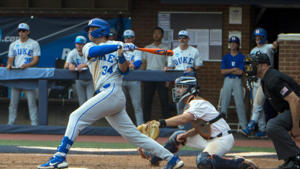UP NEXT
Gov. Roy Cooper plans to sign legislation legalizing mobile sports betting in North Carolina into law Wednesday, starting the clock for regulators to turn the bill into practice.
House Bill 347 states that mobile sports betting in North Carolina can begin as soon as January 8, but the NC Lottery Commission has up to one year from when it becomes law to have it up and running.
Cooper is planning to sign the bill at Spectrum Center in Charlotte. The home of the NBA’s Charlotte Hornets is one of eight venues in the state that will be allowed to have in-person sports books at or near their facilities.
Twelve mobile sports operators can be awarded five-year renewable licenses at a cost of $1 million to take bets from adults on phones and other electronic devices on professional, college, Olympic and other sports. Lawmakers gave their final approval on June 7.
The College Football Playoff national championship game is scheduled for January 8 in Houston.
The legislation passed the House in late March. The Senate then made a host of changes, including increasing the tax rate paid by operators and allowing gambling on horse racing, before passing its version on June 1. The House concurred with the Senate changes, giving its final approval on June 7.
In-person sports betting is currently legal at three tribal casinos in North Carolina, which will become the 28th state to legalize mobile sports betting. A 2018 U.S. Supreme Court decision allowed states to decide if they wanted to legalize sports betting. An effort to legalize mobile sports betting failed in the House by a single vote in 2022.
The eight venues that would be permitted to have either permanent or temporary in-person sports books are PNC Arena in Raleigh, WakeMed Soccer Park in Cary, Bank of America Stadium and Spectrum Center in Charlotte, Charlotte Motor Speedway in Concord, North Wilkesboro Speedway, Sedgefield Country Club in Greensboro and Quail Hollow Country Club in Charlotte.
“For us, it’s a big, big deal because we’re trying to make PNC Arena a destination place,” said Don Waddell, the Carolina Hurricanes’ team president and general manager. “This is another way to encourage people to come out to the arena.”
Where the money goes
The bill allocates money from license fees and taxes to several different areas after the Department of Revenue and Lottery Commission receive money for expenses. Projections indicate the state coud generate about $100 million in taxes from sports betting by its fifth year. The state will collect an 18% tax on gross gaming revenue from operators.
- $2 million annually for Department of Health and Human Services for gambling addiction education and treatment programs.
- $1 million annually to North Carolina Amateur Sports for grants to local governments or non-profit organizations to expand opportunities for youth sports participation. Organizations in a single county can receive no more than 1% of the total funding.
- $300,000 to the athletic departments at Appalachian State, East Carolina, Elizabeth City State, Fayetteville State, North Carolina A&T, North Carolina Central, UNC-Asheville, UNC-Charlotte, UNC-Greensboro, UNC-Pembroke, UNC-Wilmington, Western Carolina and Winston-Salem State.
- $1 million to the North Carolina Heritage Advisory Council for grants to assist youth teams travel to events or attract events to North Carolina.
- Of the remaining proceeds: 20% to the athletic departments at the above colleges and universities; 30% to the North Carolina Major Events, Games and Attractions Fund; 50% to the state’s General Fund. The Major Events, Games and Attractions Fund would provide grants to draw entertainment, musical, political, sporting or theatrical events, held no more than once a year, to the state’s sports facilities and venues.
